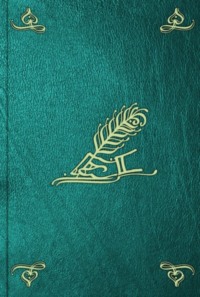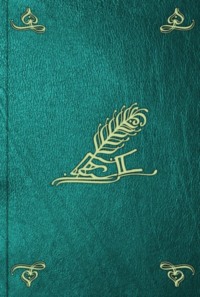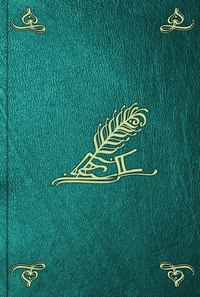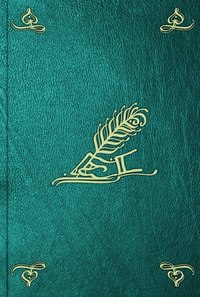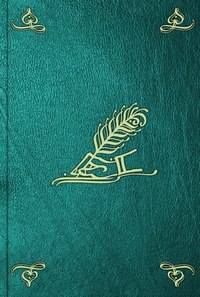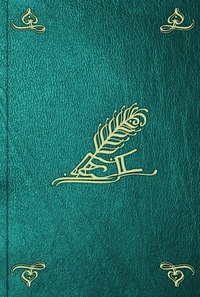 полная версия
полная версияMore Letters of Charles Darwin — Volume 1
I sincerely hope that you have had a prosperous expedition, and have met with many new and interesting animals. If you have spare time I should much like to hear what you have been doing and observing. As for myself, I have sent the MS. of my book on domestic animals, etc., to the printers. It turns out to be much too large; it will not be published, I suppose, until next November. I find that we have discussed several of the same subjects, and I think we agree on most points fairly well. I have lately heard several times from Fritz Muller, but he seems now chiefly to be working on plants. I often think of your visit to this house, which I enjoyed extremely, and it will ever be to me a real pleasure to remember our acquaintance. From what I heard in London I think you made many friends there. Shall you return through England? If so, and you can spare the time, we shall all be delighted to see you here again.
LETTER 199. TO T. RIVERS. Down, January 11th {1867?}.
How rich and valuable a letter you have most kindly sent me! The case of Baronne Prevost (199/1. See "Variation under Domestication," Edition II., Volume I., page 406. Mr. Rivers had a new French rose with a delicate smooth stem, pale glaucous leaves and striped flesh-coloured flowers; on branches thus characterised there appeared "the famous old rose called 'Baronne Prevost,'" with its stout thorny stem and uniform rich-coloured double flowers.), with its different shoots, foliage, spines, and flowers, will be grand to quote. I am extremely glad to hear about the seedling moss-roses. That case of a seedling like a Scotch rose, unless you are sure that no Scotch rose grew near (and it is unlikely that you can remember), must, one would think, have been a cross.
I have little compunction for being so troublesome — not more than a grand Inquisitor has in torturing a heretic — for am I not doing a real good public service in screwing crumbs of knowledge out of your wealth of information?
P.S. Since the above was written I have read your paper in the "Gardeners' Chronicle": it is admirable, and will, I know, be a treasure to me. I did not at all know how strictly the character of so many flowers is inherited.
On my honour, when I began this note I had no thought of troubling you with a question; but you mention one point so interesting, and which I have had occasion to notice, that I must supplicate for a few more facts to quote on your authority. You say that you have one or two seedling peaches (199/2. "On raising Peaches, Nectarines, and other Fruits from Seed." By Thomas Rivers, Sawbridgeworth. — "Gard. Chron." 1866, page 731.) approaching very nearly to thick-fleshed almonds (I know about A. Knight and the Italian hybrid cases). Now, did any almond grow near your mother peach? But especially I want to know whether you remember what shape the stone was, whether flattened like that of an almond; this, botanically, seems the most important distinction. I earnestly wish to quote this. Was the flesh at all sweet?
Forgive if you can.
Have you kept these seedling peaches? if you would give me next summer a fruit, I want to have it engraved.
LETTER 200. TO I. ANDERSON-HENRY. May 22nd {1867}.
You are so kind as to offer to lend me Maillet's (200/1. For De Maillet see Mr. Huxley's review on "The Origin of Species" in the "Westminster Review," 1860, reprinted in "Lay Sermons," 1870, page 314. De Maillet's evolutionary views were published after his death in 1748 under the name of Telliamed (De Maillet spelt backwards).) work, which I have often heard of, but never seen. I should like to have a look at it, and would return it to you in a short time. I am bound to read it, as my former friend and present bitter enemy Owen generally ranks me and Maillet as a pair of equal fools.
LETTER 201. TO J.D. HOOKER. Down, April 4th {1867}.
You have done me a very great service in sending me the pages of the "Farmer." I do not know whether you wish it returned; but I will keep it unless I hear that you want it. Old I. Anderson-Henry passes a magnificent but rather absurd eulogium on me; but the point of such extreme value in my eyes is Mr. Traill's (201/1. Mr. Traill's results are given at page 420 of "Animals and Plants," Edition II., Volume I. In the "Life and Letters of G.J. Romanes," 1896, an interesting correspondence is published with Mr. Darwin on this subject. The plan of the experiments suggested to Romanes was to raise seedlings from graft-hybrids: if the seminal offspring of plants hybridised by grafting should show the hybrid character, it would be striking evidence in favour of pangenesis. The experiment, however, did not succeed.) statement that he made a mottled mongrel by cutting eyes through and joining two kinds of potatoes. (201/2. For an account of similar experiments now in progress, see a "Note on some Grafting Experiments" by R. Biffen in the "Annals of Botany," Volume XVI., page 174, 1902.) I have written to him for full information, and then I will set to work on a similar trial. It would prove, I think, to demonstration that propagation by buds and by the sexual elements are essentially the same process, as pangenesis in the most solemn manner declares to be the case.
LETTER 202. TO T.H. HUXLEY. Down, June 12th {1867?}.
We come up on Saturday, the 15th, for a week. I want much to see you for a short time to talk about my youngest boy and the School of Mines. I know it is rather unreasonable, but you must let me come a little after 10 o'clock on Sunday morning, the 16th. If in any way inconvenient, send me a line to "6, Queen Anne Street W.,"; but if I do not hear, I will (stomacho volente) call, but I will not stay very long and spoil your whole morning as a holiday. Will you turn two or three times in your mind this question: what I called "pangenesis" means that each cell throws off an atom of its contents or a gemmule, and that these aggregated form the true ovule or bud, etc.? Now I want to know whether I could not invent a better word. "Cyttarogenesis" (202/1. From kuttaros, a bee's-cell: cytogenesis would be a natural form of the word from kutos.) — i.e. cell-genesis — is more true and expressive, but long. "Atomogenesis" sounds rather better, I think, but an "atom" is an object which cannot be divided; and the term might refer to the origin of atoms of inorganic matter. I believe I like "pangenesis" best, though so indefinite; and though my wife says it sounds wicked, like pantheism; but I am so familiar now with this word, that I cannot judge. I supplicate you to help me.
LETTER 203. TO A.R. WALLACE. Down, October, 12th and 13th {1867}.
I ordered the journal (203/1. "Quarterly Journal of Science," October, 1867, page 472. A review of the Duke of Argyll's "Reign of Law.") a long time ago, but by some oversight received it only yesterday, and read it. You will think my praise not worth having, from being so indiscriminate; but if I am to speak the truth, I must say I admire every word. You have just touched on the points which I particularly wished to see noticed. I am glad you had the courage to take up Angraecum (203/2. Angraecum sesquipedale, a Madagascan orchid, with a whiplike nectary, 11 to 12 inches in length, which, according to Darwin ("Fertilisation of Orchids," Edition II., page 163), is adapted to the visits of a moth with a proboscis of corresponding length. He points out that there is no difficulty in believing in the existence of such a moth as F. Muller has described ("Nature," 1873, page 223) — a Brazilian sphinx-moth with a trunk of 10 to 11 inches in length. Moreover, Forbes has given evidence to show that such an insect does exist in Madagascar ("Nature," VIII., 1873, page 121). The case of Angraecum was put forward by the Duke of Argyll as being necessarily due to the personal contrivance of the Deity. Mr. Wallace (page 476) shows that both proboscis and nectary might be increased in length by means of Natural Selection. It may be added that Hermann Muller has shown good grounds for believing that mutual specialisation of this kind is beneficial both to insect and plant.) after the Duke's attack; for I believe the principle in this case may be widely applied. I like the figure, but I wish the artist had drawn a better sphinx. With respect to beauty, your remarks on hideous objects and on flowers not being made beautiful except when of practical use to them, strike me as very good. On this one point of beauty I can hardly think that the Duke was quite candid. I have used in the concluding paragraph of my present book precisely the same argument as you have, even bringing in the bull-dog (203/3. "Variation of Animals and Plants," Edition I., Volume II., page 431: "Did He cause the frame and mental qualities of the dog to vary in order that a breed might be formed of indomitable ferocity, with jaws fitted to pin down the bull for man's brutal sport?"), with respect to variations not having been specially ordained. Your metaphor of the river (203/4. See Wallace, op. cit., pages 477-8. He imagines an observer examining a great river-system, and finding everywhere adaptations which reveal the design of the Creator. "He would see special adaptation to the wants of man in broad, quiet, navigable rivers, through fertile alluvial plains that would support a large population, while the rocky streams and mountain torrents were confined to those sterile regions suitable only for a small population of shepherds and herdsmen.') is new to me, and admirable; but your other metaphor, in which you compare classification and complex machines, does not seem to me quite appropriate, though I cannot point out what seems deficient. The point which seems to me strong is that all naturalists admit that there is a natural classification, and it is this which descent explains. I wish you had insisted a little more against the "North British" (203/5. At page 485 Mr. Wallace deals with Fleeming Jenkin's review in the "North British Review," 1867. The review strives to show that there are strict limits to variation, since the most rigorous and long-continued selection does not indefinitely increase such a quality as the fleetness of a racehorse. On this Mr. Wallace remarks that "this argument fails to meet the real question," which is, not whether indefinite change is possible, "but whether such differences as do occur in nature could have been produced by the accumulation of variations by selection.") on the reviewer assuming that each variation which appears is a strongly marked one; though by implication you have made this very plain. Nothing in your whole article has struck me more than your view with respect to the limit of fleetness in the racehorse and other such cases: I shall try and quote you on this head in the proof of my concluding chapter. I quite missed this explanation, though in the case of wheat I hit upon something analogous. I am glad you praise the Duke's book, for I was much struck with it. The part about flight seemed to me at first very good; but as the wing is articulated by a ball-and-socket joint, I suspect the Duke would find it very difficult to give any reason against the belief that the wing strikes the air more or less obliquely. I have been very glad to see your article and the drawing of the butterfly in "Science Gossip." By the way, I cannot but think that you push protection too far in some cases, as with the stripes on the tiger. I have also this morning read an excellent abstract in the "Gardeners' Chronicle" of your paper on nests. (203/6. An abstract of a paper on "Birds' Nests and Plumage," read before the British Association: see "Gard. Chron." 1867, page 1047.) I was not by any means fully converted by your letter, but I think now I am so; and I hope it will be published somewhere in extenso. It strikes me as a capital generalisation, and appears to me even more original than it did at first...
I have finished Volume I. of my book {"Variation of Animals and Plants"}, and I hope the whole will be out by the end of November. If you have the patience to read it through, which is very doubtful, you will find, I think, a large accumulation of facts which will be of service to you in future papers; and they could not be put to better use, for you certainly are a master in the noble art of reasoning.
LETTER 204. TO T.H. HUXLEY. Down, October 3rd {no date}.
I know you have no time for speculative correspondence; and I did not in the least expect an answer to my last. But I am very glad to have had it, for in my eclectic work the opinions of the few good men are of great value to me.
I knew, of course, of the Cuvierian view of classification (204/1. Cuvier proved that "animals cannot be arranged in a single series, but that there are several distinct plans of organisation to be observed among them, no one of which, in its highest and most complicated modification, leads to any of the others" (Huxley's "Darwiniana," page 215).); but I think that most naturalists look for something further, and search for "the natural system," — "for the plan on which the Creator has worked," etc., etc. It is this further element which I believe to be simply genealogical.
But I should be very glad to have your answer (either when we meet or by note) to the following case, taken by itself, and not allowing yourself to look any further than to the point in question. Grant all races of man descended from one race — grant that all the structure of each race of man were perfectly known — grant that a perfect table of the descent of each race was perfectly known — grant all this, and then do you not think that most would prefer as the best classification, a genealogical one, even if it did occasionally put one race not quite so near to another, as it would have stood, if collocated by structure alone? Generally, we may safely presume, that the resemblance of races and their pedigrees would go together.
I should like to hear what you would say on this purely theoretical case.
It might be asked why is development so all-potent in classification, as I fully admit it is? I believe it is because it depends on, and best betrays, genealogical descent; but this is too large a point to enter on.
LETTER 205. TO C. LYELL. Down, December 7th {1867}.
I send by this post the article in the Victorian Institute with respect to frogs' spawn. If you remember in your boyhood having ever tried to take a small portion out of the water, you will remember that it is most difficult. I believe all the birds in the world might alight every day on the spawn of batrachians, and never transport a single ovum. With respect to the young of molluscs, undoubtedly if the bird to which they were attached alighted on the sea, they would be instantly killed; but a land-bird would, I should think, never alight except under dire necessity from fatigue. This, however, has been observed near Heligoland (205/1. Instances are recorded by Gatke in his "Heligoland as an Ornithological Observatory" (translated by Rudolph Rosenstock, Edinburgh, 1895) of land-birds, such as thrushes, buntings, finches, etc., resting for a short time on the surface of the water. The author describes observations made by himself about two miles west of Heligoland (page 129).); and land-birds, after resting for a time on the tranquil sea, have been seen to rise and continue their flight. I cannot give you the reference about Heligoland without much searching. This alighting on the sea may aid you in your unexpected difficulty of the too-easy diffusion of land-molluscs by the agency of birds. I much enjoyed my morning's talk with you.
LETTER 206. TO F. HILDEBRAND. Down, January 5th {1868}.
I thank you for your letter, which has quite delighted me. I sincerely congratulate you on your success in making a graft-hybrid (206/1. Prof. Hildebrand's paper is in the "Bot. Zeitung," 1868: the substance is given in "Variation of Animals and Plants," Edition II., Volume I., page 420.), for I believe it to be a most important observation. I trust that you will publish full details on this subject and on the direct action of pollen (206/2. See Prof. Hildebrand, "Bot. Zeitung," 1868, and "Variation of Animals and Plants," Edition II., Volume I., page 430. A yellow-grained maize was fertilised with pollen from a brown-grained one; the result was that ears were produced bearing both yellow and dark-coloured grains.): I hope that you will be so kind as to send me a copy of your paper. If I had succeeded in making a graft-hybrid of the potato, I had intended to raise seedlings from the graft-hybrid and from the two parent-forms (excluding insects) and carefully compare the offspring. This, however, would be difficult on account of the sterility and variability of the potato. When in the course of a few months you receive my second volume (206/3. This sentence may be paraphrased — "When you receive my book and read the second volume."), you will see why I think these two subjects so important. They have led me to form a hypothesis on the various forms of reproduction, development, inheritance, etc., which hypothesis, I believe, will ultimately be accepted, though how it will be now received I am very doubtful.
Once again I congratulate you on your success.
LETTER 207. TO J.D. HOOKER. Down, January 6th {1868}.
Many thanks about names of plants, synonyms, and male flowers — all that I wanted.
I have been glad to see Watson's letter, and am sorry he is a renegade about Natural Selection. It is, as you say, characteristic, with the final fling at you.
His difficulty about the difference between the two genera of St. Helena Umbellifers is exactly the same as what Nageli has urged in an able pamphlet (207/1. "Ueber Entstehung und Begriff der naturhist. Art." "Sitz. der K. Bayer. Akad. Der Wiss. zu Munchen," 1865. Some of Nageli's points are discussed in the "Origin," Edition V., page 151.), and who in consequence maintains that there is some unknown innate tendency to progression in all organisms. I said in a letter to him that of course I could not in the least explain such cases; but that they did not seem to me of overwhelming force, as long as we are quite ignorant of the meaning of such structures, whether they are of any service to the plants, or inevitable consequences of modifications in other parts.
I cannot understand what Watson means by the "counter-balance in nature" to divergent variation. There is the counterbalance of crossing, of which my present work daily leads me to see more and more the efficiency; but I suppose he means something very different. Further, I believe variation to be divergent solely because diversified forms can best subsist. But you will think me a bore.
I enclose half a letter from F. Muller (which please return) for the chance of your liking to see it; though I have doubted much about sending it, as you are so overworked. I imagine the Solanum-like flower is curious.
I heard yesterday to my joy that Dr. Hildebrand has been experimenting on the direct action of pollen on the mother-plant with success. He has also succeeded in making a true graft-hybrid between two varieties of potatoes, in which I failed. I look at this as splendid for pangenesis, as being strong evidence that bud-reproduction and seminal reproduction do not essentially differ.
My book is horribly delayed, owing to the accursed index-maker. (207/2. Darwin thoroughly appreciated the good work put into the index of "The Variation of Animals and Plants.") I have almost forgotten it!
LETTER 208. TO T.H. HUXLEY. Down, January 30th {1868}.
Most sincere thanks for your kind congratulations. I never received a note from you in my life without pleasure; but whether this will be so after you have read pangenesis (208/1. In Volume II. of "Animals and Plants, 1868.), I am very doubtful. Oh Lord, what a blowing up I may receive! I write now partly to say that you must not think of looking at my book till the summer, when I hope you will read pangenesis, for I care for your opinion on such a subject more than for that of any other man in Europe. You are so terribly sharp-sighted and so confoundedly honest! But to the day of my death I will always maintain that you have been too sharp-sighted on hybridism; and the chapter on the subject in my book I should like you to read: not that, as I fear, it will produce any good effect, and be hanged to you.
I rejoice that your children are all pretty well. Give Mrs. Huxley the enclosed (208/2. Queries on Expression.), and ask her to look out when one of her children is struggling and just going to burst out crying. A dear young lady near here plagued a very young child for my sake, till it cried, and saw the eyebrows for a second or two beautifully oblique, just before the torrent of tears began.
The sympathy of all our friends about George's success (it is the young Herald) (208/3. His son George was Second Wrangler in 1868; as a boy he was an enthusiast in heraldry.) has been a wonderful pleasure to us. George has not slaved himself, which makes his success the more satisfactory. Farewell, my dear Huxley, and do not kill yourself with work.
(209/1. The following group of letters deals with the problem of the causes of the sterility of hybrids. Mr. Darwin's final view is given in the "Origin," sixth edition (page 384, edition 1900). He acknowledges that it would be advantageous to two incipient species, if by physiological isolation due to mutual sterility, they could be kept from blending: but he continues, "After mature reflection it seems to me that this could not have been effected through Natural Selection." And finally he concludes (page 386): —
"But it would be superfluous to discuss this question in detail; for with plants we have conclusive evidence that the sterility of crossed species must be due to some principle quite independent of Natural Selection. Both Gartner and Kolreuter have proved that in genera including numerous species, a series can be formed from species which when crossed yield fewer and fewer seeds, to species which never produce a single seed, but yet are affected by the pollen of certain other species, for the germen swells. It is here manifestly impossible to select the more sterile individuals, which have already ceased to yield seeds; so that this acme of sterility, when the germen alone is affected, cannot have been gained through selection; and from the laws governing the various grades of sterility being so uniform throughout the animal and vegetable kingdoms, we may infer that the cause, whatever it may be, is the same or nearly the same in all cases."
Mr. Wallace, on the other hand, still adheres to his view: see his "Darwinism," 1889, page 174, and for a more recent statement see page 292, note 1, Letter 211, and page 299.
The discussion of 1868 began with a letter from Mr. Wallace, written towards the end of February, giving his opinion on the "Variation of Animals and Plants;" the discussion on the sterility of hybrids is at page 185, Volume II., of the first edition.)
LETTER 209. A.R. WALLACE TO CHARLES DARWIN. February 1868.
The only parts I have yet met with where I somewhat differ from your views, are in the chapter on the causes of variability, in which I think several of your arguments are unsound: but this is too long a subject to go into now. Also, I do not see your objection to sterility between allied species having been aided by Natural Selection. It appears to me that, given a differentiation of a species into two forms, each of which was adapted to a special sphere of existence, every slight degree of sterility would be a positive advantage, not to the individuals who were sterile, but to each form. If you work it out, and suppose the two incipient species a...b to be divided into two groups, one of which contains those which are fertile when the two are crossed, the other being slightly sterile, you will find that the latter will certainly supplant the former in the struggle for existence; remembering that you have shown that in such a cross the offspring would be more vigorous than the pure breed, and therefore would certainly soon supplant them, and as these would not be so well adapted to any special sphere of existence as the pure species a and b, they would certainly in their turn give way to a and b.
LETTER 210. TO A.R. WALLACE. February 27th {1868}.



